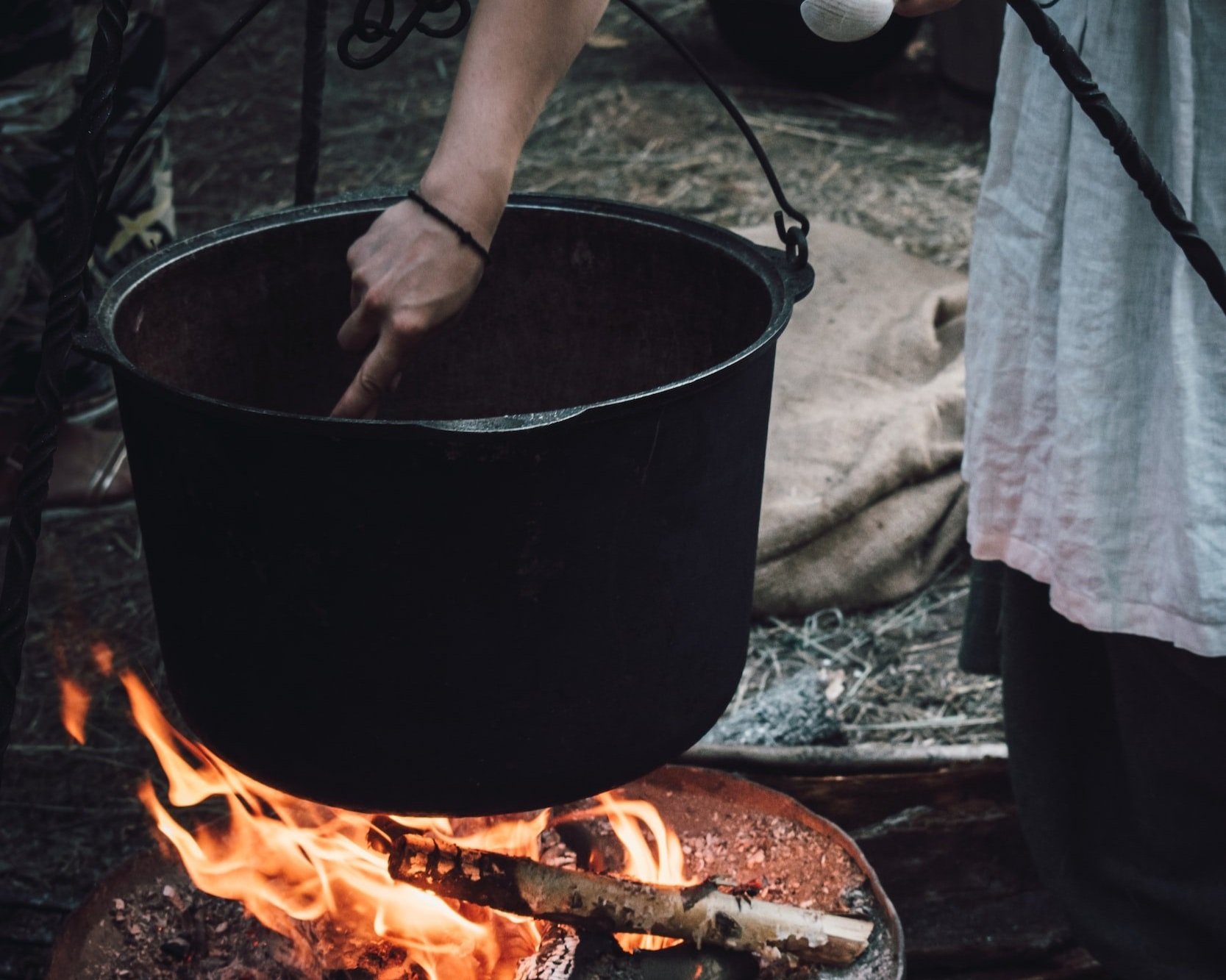TALIESIN
Image courtesy of Unsplash.
Ceridwen was mistress fair of poetry and song;
She had two children with her mate, a giant grim and strong.
Her daughter was the loveliest the land had ever seen.
Her son was hideous ugly, grossly stupid, coarse and mean.
Ceridwen brewed cauldron after cauldron full of spells
To heal her son’s obscenity. She begged the holy wells
To fill her cauldron one last time, a towering spell to cast;
She gathered herbs, intoned the words, till all was primed at last.
When spell was ripe, then three mere drops would change the gnarled young man
Into a Bard with insight, words, and magic at command,
Skill in poetry and song, and gifts of prophecy;
In one year’s time, her son would be reborn a prodigy!
But only those three drops would work that left the cauldron first;
The rest would turn to poison, and the land become accursed.
She would not let that happen, swore the Lady Ceridwen,
And the Fae themselves would notice take of her High Bardic son.
Gwion Bach, a servant boy, was set to stir the brew;
A blind man piled on the wood to feed the flames anew;
A year, a day, from sundown to sunrise, must Gwion stir;
The fire must not go out, the stirring paddle never tire.
The year and day were passed away, and Gwion, growing weary,
Was careless with the paddle as his eyes grew dull and bleary.
Three drops leaped from the cauldron to his thumb; without a thought
He thrust the thumb into his mouth because the drops were hot.
Gwion felt the change in mind and body with the brew,
And in her great hall, Ceridwen felt also, and she knew.
“The slave has stolen the saving drops were meant to heal my son!”
Gwion turned into a hare and over the fields did run.
Into a greyhound Ceridwen transformed herself, and ran;
Gwion saw her coming, to a salmon changed, and swam.
She turned herself to otter bitch to pull him from his skin;
He turned into a swallow--the air-currents he would skim.
She changed into a hawk, and he, spying a heap of grain,
Changed into one, sole kernel, never to be found again.
So wroth was Lady Ceridwen for her benighted son,
She changed into a giant hen, and ate them, every one.
The cauldron cracked, and spread its poison all throughout the land;
It fouled the drinking water; men with horses at command
Found corpses where their beasts had drunk, because the Lady’s brewing
Killed fish and bird and beast and man, and left all things in ruin.
Before six weeks were past and gone, she knew she went with child;
Moreover, she knew who it was; the knowledge drove her wild.
For Gwion Bach grew strong within, waiting to be reborn.
She vowed to kill him when his eyes first opened on the morn.
But babe within and babe without are not the same, she learned;
She beheld her child’s beauty, and she could not have him burned.
She set him in a coracle and let him drift away.
He fetched up on a salmon weir just at the break of day.
The man who pulled him out looked not for anything amazing;
He beheld the child’s radiant brow, and murmured, “tal iesin!” (1)
And that became his name; his fame spread like a flame around;
His prophesies and poems led kings to victories and crowns.
He’s known as greatest of Welsh bards, for poetry and magic,
For prophecy and song that hymned triumphant things and tragic.
He brought good fortune to the kings of Britons and of Welsh,
And all because he tasted brew was meant for someone else.
Epilogue
To brew a brew that would all renew—it’s really almost funny;
For brotherly love’s for brotherly love, but medicine’s for money.
And if the poisoned land had been insured—no harm, no foul;
Besides, it isn’t our patch; let the death-brew take it all.
Now, we who spend a far-off time within a distant land
(We took it from the natives, who just didn’t understand)
Once found our God as small and weak as sleepy little Gwion;
He came to us a Jew, but we have made him European.
We asked a God to bless our crops, but He saw all were fed;
We asked a God Who howled for blood, and not for One who bled;
A God Who’d keep our nation pure—but He embraced the stranger.
So, seeing it was Him or us; we summoned the Shape-Changer.
With optics, buzzwords, focus groups, we looked God in the eyes;
With talking points and Twitter posts, we cut Him down to size;
We can’t abide judge not, give all, and love your enemies;
So we brought the great Shape-Changer to bring that God to His knees.
So now our God has shifted shape; He brandishes a rifle,
Patrols the border, waves the flag, and legislates a trifle.
With tax-collecting sinners He no more sits down to mirth,
And He’s blessed our leaking cauldrons that are poisoning the earth.
And should He rise against as another Taliesin,
From Sandy Hook, Uvalde, or the Colorado Basin,
We’ll raise our whistles to our lips, call up the Hounds of Fear,
And we’ll be safe from Commies, or whatever’s bad that year.
Old Welsh, “How his brow shines!”

